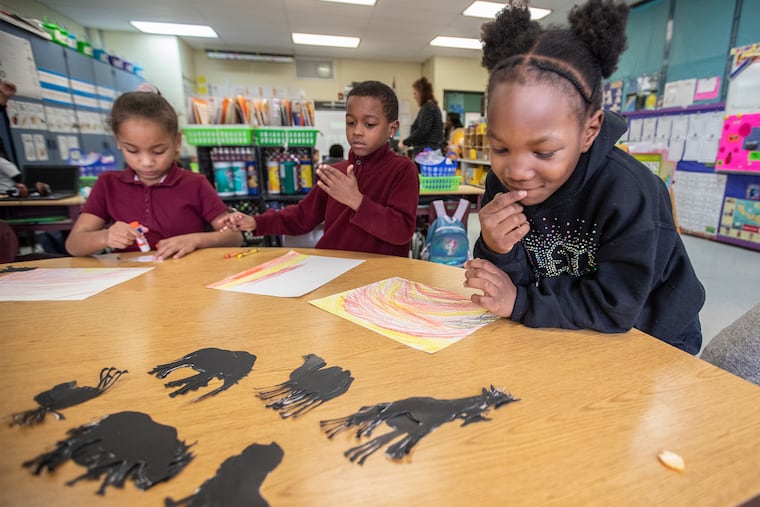Black History Month is every month at this New Jersey school
New Jersey requires public schools to infuse black history lessons into the curriculum, but not all schools are meeting the mandate. A South Jersey school has become a model for how to teach black history year-round.

When Black History Month ends this week, first-grade teacher Tamar LaSure-Owens plans to stay on her mission to change how the subject is taught in New Jersey public schools — year-round.
At the Leeds Avenue Elementary School in Pleasantville, LaSure-Owens has been leading a charge to infuse black history into everyday lessons. A state mandate requires it for all public schools, but compliance has been spotty.
» READ MORE: N.J. sending teachers to visit trans-Atlantic slave sites to teach black history in public schools
“This isn’t written down,” said LaSure-Owens. “This is something that all students should have.”
The state’s Amistad law, signed by Gov. Jim McGreevey in 2002, requires public schools to incorporate African American history into K-12 social studies lessons. The law honors the enslaved Africans who gained their freedom after overthrowing the crew of the slave ship Amistad in 1839.
Stephanie Harris is executive director of the Amistad Commission, which provides training to help teachers develop lesson plans that accurately reflect black history and the trans-Atlantic slave trade. Educators plan to meet Friday in Trenton to promote awareness.
”Black history is American history. We’ll get it done,” said Gary Melton, associate director of the executive office of the New Jersey Education Association.
The Amistad law is similar to a 1994 law requiring Holocaust and genocide education in public schools and talks about bias, prejudice, bigotry, and bullying. Starting in September, New Jersey schools must also include instruction about the contributions of lesbian, gay, bisexual, and transgender people.
» READ MORE: Cheltenham teacher is inspired by great-grandmother’s work rescuing Jews during Holocaust
It is unclear how many of the state’s 600 districts are embedding African American history into lesson plans. State Education Commissioner Lamont O. Repollet has said districts that fail to comply can lose points in their state evaluation.
(Pennsylvania also requires history to be taught, but districts decide the content of their courses. In Philadelphia, a course in African American history is a graduation requirement.)
At the Leeds Avenue school, there are posters on the hallways, including portraits of civil rights icon Rosa Parks created by students. The Amistad curriculum is infused into language arts, math, and science at the Atlantic County school.
On a recent morning, first graders in LaSure-Owens’ class learned about African safari animals such as lions, elephants, and giraffes. For a vocabulary lesson, they used Chromebooks with headsets to practice pronouncing the words.
Three other first-grade teachers worked from the same lesson plan, which was developed by LaSure-Owens. She hopes to create more black history lessons for the entire school, which enrolls about 500 pre-K to fifth graders.
“This is what we do daily,” said LaSure-Owens.
Next door, geometry teacher Jayson Benson put his third graders in small groups and taught a lesson on a timeline of ancient Egypt. Another group watched a video on how the pyramids were built. Another group worked on a hieroglyphic activity.
“The kids have really embraced it. They see it’s not a one-month activity," said Benson, who has been teaching for 17 years. “It’s exposing them to things I have never taught.”
Fifth-grade teacher Ronald Fogg grilled students on world geography.
“How many countries in the continent of Africa?" he asked.
Joycelyn Howard, 10, quickly answered: “54.”
The lessons include discussions about other cultures and ethnicities. The Leeds Avenue school is about 75% Latino.
“It’s my culture and I love learning about new things,” said third grader Gianna Ulloa, 9, who is of Hispanic and Latino ancestry.
In a second-grade language arts class, students read the book Bad Hair Does Not Exist! in English and Spanish. A “Hair Love” lesson covered grammar, social studies, and cultural respect. Students made artwork of popular hairstyles, including an Afro, twists, and braids.
The Leeds school integrated the Amistad content for the 2018-19 school year with 13 units. Principal Lisa Stuart-Smith praised LaSure-Owens as the “driving force“ behind the curriculum, which has been heralded by state education officials as a model for other districts.
LaSure-Owens, 46, said she became interested in the Amistad curriculum after attending a summer institute sponsored by the Amistad Commission. She was surprised to learn that many social studies lesson plans were outdated and teachers lacked textbooks and resources needed to properly teach black history.
This summer, about 20 educators will be selected for an Amistad journey program to visit U.S. slavery sites, such as New Orleans and Jamestown, Va., and later include a trip to Ghana, where Africans walked through the “door of no return” at Cape Coast onto slave ships.
“It’s a statement on who we are as a people,” she said. “It’s crucial and it’s needed.”